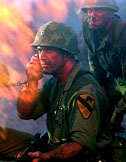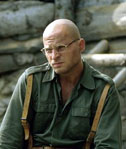|
Movie Guru Ratings:
We Were Soldiers

No Man's Land

Comment
on this review
| |

We Were Soldiers and No Man's Land offer opposing perspectives on war.
by Jesse Fox Mayshark
The American war movie is at an uneasy point in its evolution. In the immediate aftermath of Vietnam, the old model war film—in which young, brave soldiers were led to victory by tough but paternal men like John Wayne or Gary Cooper—pretty much went out the window. All the Hollywood hokum about honor and glory was a hard sell in the face of nightly battlefield reports and first-hand accounts of the war's devastation.
So the 1970s brought us a different kind of film, movies that portrayed war as a fundamentally deranged enterprise that tainted all associated with it. Whether in post-war trauma dramas (Coming Home, The Deer Hunter) or absurdist battlefield skewerings (Apocalypse Now, M*A*S*H), the warrior myths were battered again and again. The new perspective even reached back to earlier American history, showing the brutalization of the American West (Little Big Man) and World War I (Johnny Got His Gun).
During the Reagan era, of course, things changed. Movies like An Officer and a Gentleman and Top Gun reaffirmed the dignity of the armed forces, and violent fantasies of the Stallone/Schwarzenegger school allowed us to refight Vietnam and "win." On the liberal side, Oliver Stone continued the Vietnam exorcism with Platoon and Born on the Fourth of July, which combined a general sense of the war's injustice with more old-fashioned symbolic uplift. In these visions, war was still hell, but the nobility started to creep back in.
It was up to Steven Spielberg to put all the pieces back together. He did it in Saving Private Ryan, using the best in modern cinematic effects to show us what a battlefield is actually like and then harnessing that visceral horror to a hoary fairy tale about one small group of soldiers sacrificing themselves to save another. It was an awkward fit, the sentimentality and the slaughter, but it has become our new paradigm. Now, war movies are expected to show us the frenzy and confusion and raw bleeding wounds, the faces and limbs blown half off, the screaming and writhing. But they're also supposed to contain all of that within a conventional good guy/bad guy framework. We're supposed to leave feeling battered but ennobled, just like the men on the screen.
The result is movies like Black Hawk Down and, most recently, We Were Soldiers. Ostensibly, We Were Soldiers is an apolitical film, a Vietnam War movie told strictly from the trenches. There are occasional allusions to politics—the always accursed "bureaucrats" and Pentagon officials—but mostly this is an account of one battle told from one officer's point of view. That officer, Lt. Col. Hal Moore, wrote the book the movie is based on, We Were Soldiers  Once...And Young, along with war correspondent Joseph Galloway. I can't speak for the book, but in the movie, Moore (as played by a monotonously steely-eyed Mel Gibson) comes across as equal parts Patton, Sgt. York and Atticus Finch, a charismatic leader of men who also happens to be a brilliant battlefield strategist and a loving father figure. Once...And Young, along with war correspondent Joseph Galloway. I can't speak for the book, but in the movie, Moore (as played by a monotonously steely-eyed Mel Gibson) comes across as equal parts Patton, Sgt. York and Atticus Finch, a charismatic leader of men who also happens to be a brilliant battlefield strategist and a loving father figure.
The film (adapted and directed by Randall Wallace, who wrote Gibson's Oscar-winning Braveheart) uses familiar tropes—the training sequences, the bonding between the men, the weepy but supportive wives. It eventually lands the men in Vietnam where, in 1965, Moore led them into the first major battle between American and North Vietnamese troops. The battlefield is chaos, lots of people get killed, and at the end of it nobody thinks to ask what they were doing there in the first place. After all, as the poet said, theirs is not to reason why.
The problem is, it's easy for poets—and filmmakers—to get overly worked up about the nobility of battle. The film, and presumably Moore, want us to appreciate the courage of these men (and also of the North Vietnamese, who are presented as honorable foes), regardless of its context. But when the movie indulges in a closing shot of the Vietnam War Memorial, reminding us that 58,000 American soldiers died there, that long black wall feels like a negation of all the forced bravado that comes before. The film may not want to deal with the reasons that Moore and his men and so many others ended up killing and being killed in Vietnam, but those questions—and their nagging lack of courageous, noble answers—are there nonetheless.
A very different kind of war film also opened in Knoxville last week. No Man's Land, written and directed by Bosnian director Danis Tanovic, is a grimly comic parable about the Serbian-Bosnian war. Through a series of battlefield mishaps, three soldiers wind up trapped in the same trench. Two are Bosnian, one's a Serb. All are wounded, and one of the Bosnians is lying on a  land mine that will kill all of them if he moves. As the other two soldiers try to figure a way out, they re-enact the entire war in miniature—they blame each other, insult each other, threaten each other, then slowly start talking to each other as human beings. At one point, they discover they both know the same girl (who, it turns out, has fled the country as a refugee). But if you think this is going to be one of those we-can-all-get-along-once-we-talk movies, you underestimate Tanovic. land mine that will kill all of them if he moves. As the other two soldiers try to figure a way out, they re-enact the entire war in miniature—they blame each other, insult each other, threaten each other, then slowly start talking to each other as human beings. At one point, they discover they both know the same girl (who, it turns out, has fled the country as a refugee). But if you think this is going to be one of those we-can-all-get-along-once-we-talk movies, you underestimate Tanovic.
Unlike Wallace, Tanovic won't ignore history to suit his tale. The U.N. is called in, the media shows up, but in the end, everything's at least as messy as it was to start with. No Man's Land closes with a damning final shot that suggests little hope of resolution or satisfaction for anyone. It locates the causes of war not in the far-off Pentagon suites favored by films like We Were Soldiers, but deep in our own flawed selves. It finds no solace in either courage or sacrifice. And, unlike the screening of We Were Soldiers I attended, it generated no audience applause at the end.

March 7, 2001 * Vol. 12, No. 10
© 2000 Metro Pulse
|